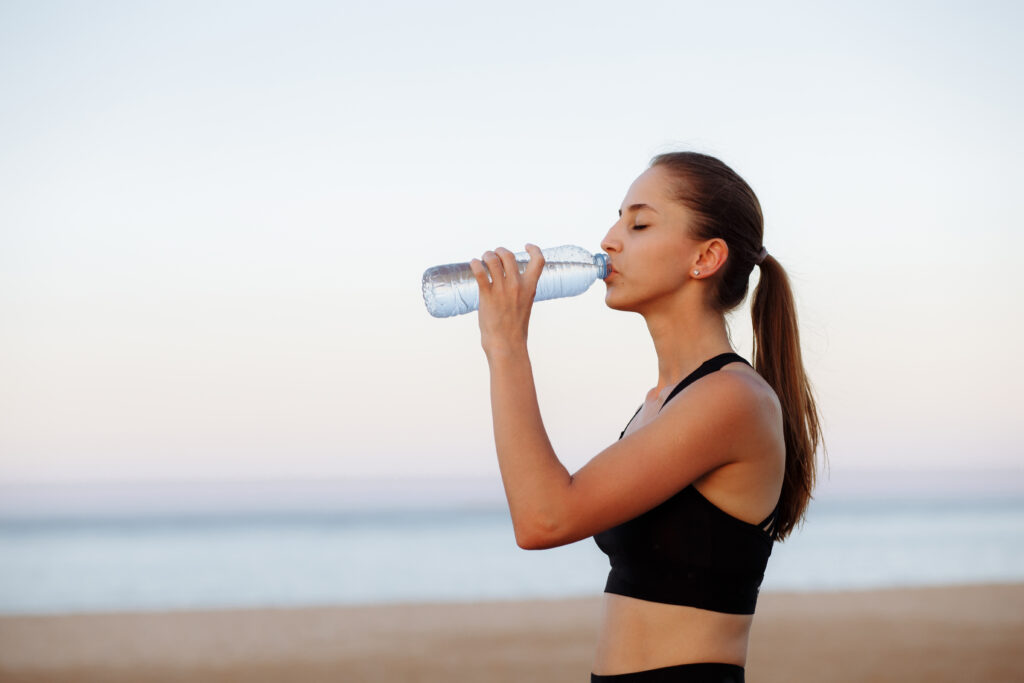Our body has many different systems and processes that work together every single day to keep us strong
and healthy. In understanding how your hormones and nutritional intake can affect your pelvic floor, you can
make informed health decisions that support your body towards a better you.
Nutrition for pelvic floor health
The food choices we make can impact how our bodies function. Poor decisions can result in digestion issues
like constipation. Straining whilst using the toilet puts stress on the pelvic floor, causing muscles to weaken,
which can lead to incontinence and prolapse. The Continence Foundation of Australia recommends at least
25-30g of fibre each day to reduce your risk of constipation so you can avoid related pelvic floor issues.
Drink plenty of water
Being dehydrated can cause bowel dysfunction, which may result in constipation. The
average woman should drink 2 Litres of water a day to hydrate their body and flush any toxins out of the
colon.
Eat bananas
Bananas are an excellent magnesium source for muscle and nerve function. Magnesium intake
reduces bladder spasms and incontinence by promoting the healthy processes of the diaphragms, nerves,
muscles and connective tissue that make up the pelvic floor.
Include Omega-3 in your diet
Oily fish, flax seeds, and walnuts help to reduce inflammation and irritation in
the body. Taking a high-quality supplement will also help to ensure you get your daily omega-3 intake.
Enjoy low-acid fruit and veg
Choose foods like avocado, peas, and apples, and avoid highly acidic foods like
tomato, citrus fruit, and olives to protect the bladder lining and pelvic floor from irritation. Make an effort to
eat these foods throughout the day, not just at dinnertime.
Eggs and sunshine = Vitamin D
Recent studies by the Women’s Mid Life Health Journal found that women
who have low levels of Vitamin D are more likely to have Pelvic Organ Prolapse. Increase your intake by
incorporating eggs into your diet and spending time under the sun each day to improve skeletal muscle
efficiency and pelvic floor function.
Try to reduce your consumption of caffeine, alcohol, fizzy drinks, spicy food and artificial sweeteners.
How hormones affect the pelvic floor
As women, when it comes to our hormones, no two days are the same.
Hormone changes can lead to:
• Changes in muscle strength
• Vaginal dryness
• Lowered libido
• Incontinence
• Mood swings
• Difficulty sleeping
• Hair loss
• Depression and anxiety
Our hormones can also have a significant effect on pelvic floor function. Understanding how our hormones
fluctuate throughout the month can help us understand why different things are happening in the body.
During ovulation, women experience higher levels of estrogen. These heightened levels often result in
ligament laxity, where ligaments become relaxed, forcing the pelvic floor and surrounding muscles to
compensate by working harder to support themself. During perimenopause, the phase before ovarian
function winds down, estrogen levels decline, which often sees women experience worsened bladder leakage,
vaginal discomfort, sexual discomfort and even symptoms of prolapse.
Relaxin is a hormone the ovaries produce throughout the menstrual cycle to prepare you for pregnancy,
whether you’re actually pregnant or not. As the name suggests, this relaxes the muscles, seeing the body
experience ligament laxity as well as alignment problems.
When Aldosterone, Cortisol and Adrenaline are released, our bodies enter fight or flight mode, which, you
guessed it, can cause ligament laxity. If your adrenal glands are struggling to function efficiently, this could
not only be attributed to ligament laxity but also to chronic dehydration. This lack of hydration can impact
muscles, forcing them to become dry and tight, impacting the pelvic floor.
These hormones all occur naturally in the body to help our biological systems perform their best. By using
PeriCoach pelvic floor trainer for just 3 minutes a day, you can combat these symptoms and take back your
strength.



